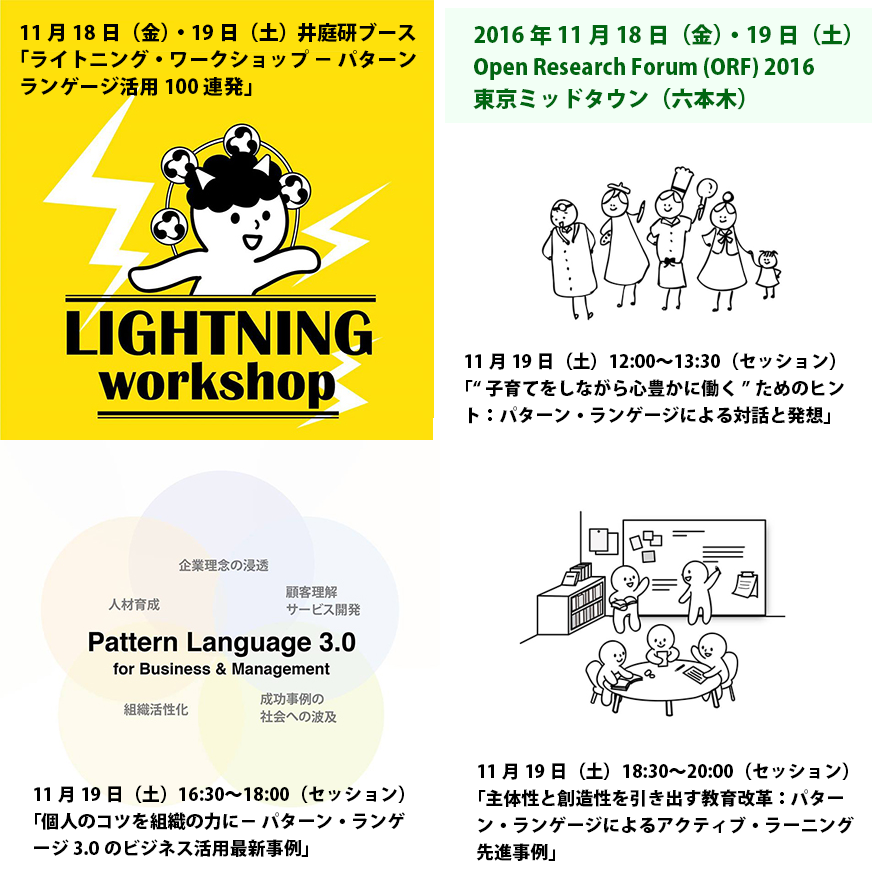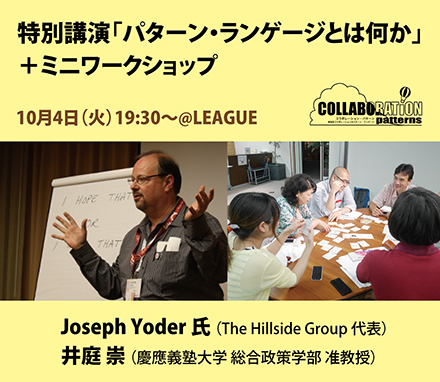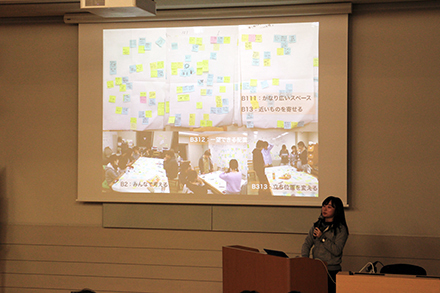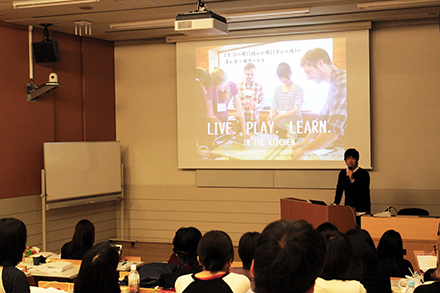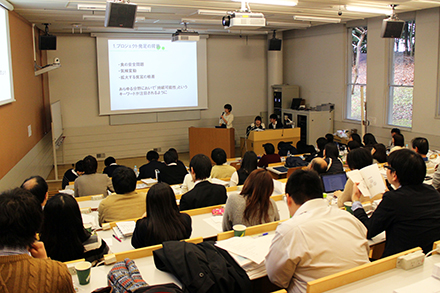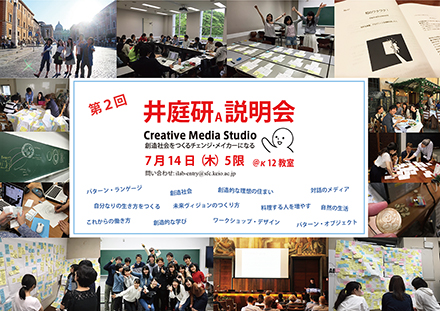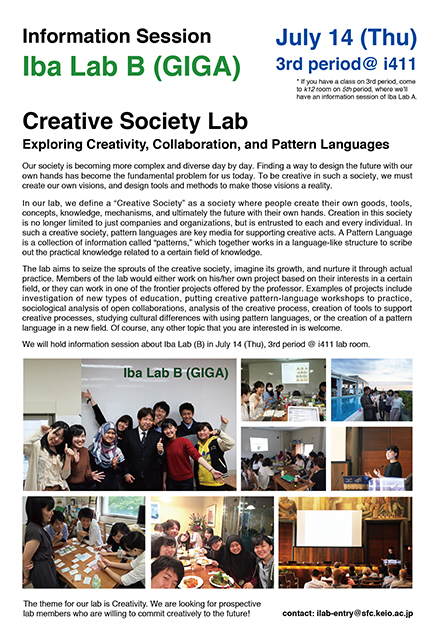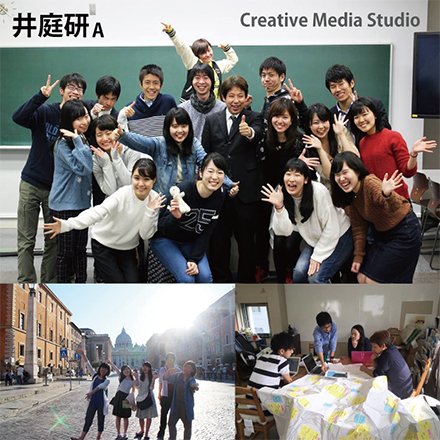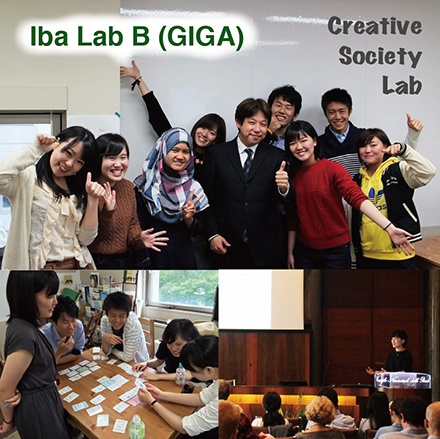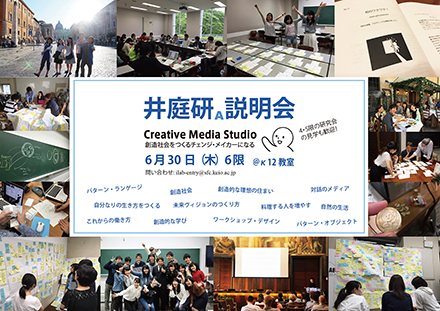2016年を振り返る:成果発表・活動等一覧(学会発表)
2016年の学会発表などを振り返りたい。
今年は、ジャーナル論文 1本、学会論文 26本、ポスター 3本の発表をし、国際学会でワークショップを5つ実施した。
発表・実施したのは、台湾、イタリア、ドイツ、アメリカで開催された5つのカンファレンス。今年も、たくさん発表したなぁ〜!一緒に論文を書いてくれた共著者たちに感謝したい。
ジャーナル論文(Journal Article)
Takashi Iba, Aya Matsumoto, Arisa Kamada, Nao Tamaki, and Tomoki Kaneko, “A Pattern Language for Living Well with Dementia: Words for a Journey,” International Journal of Organisational Design and Engineering, Volume 4, No. 1/2, 2016, pp.85-112 →論文入手
学会論文(Conference Paper)
Takashi Iba, Ayaka Yoshikawa, “Constructing the Philosophy of Pattern Language: From the Perspective of Pragmatism,” PUARL Conference 2016, USA, Oct., 2016 →論文PDF
Takashi Iba, “Future Language for Collaborative Design,” PUARL Conference 2016, USA, Oct., 2016 →論文PDF
Takashi Iba, “Creating Pattern Languages for Human Actions,” PUARL Conference 2016, USA, Oct., 2016
Haruka Mori, Yuji Harashima, Tsuyoshi Ishida, Ayaka Yoshikawa, Takashi Iba, “Project Design Patterns: Sharing the Practices in Successful Projects,” PUARL Conference 2016, USA, Oct., 2016 →論文PDF
Taichi Isaku, Takashi Iba, “The Production of Dishes: A System of Cooking in the Inclusive City,” PUARL Conference 2016, USA, Oct., 2016 →論文PDF
Takashi Iba, Ayaka Yoshikawa, “Understanding the Functions of Pattern Language with Vygotsky’s Psychology: Signs, The Zone of Proximal Development, and Predicate in Inner Speech,” 23rd Conference on Pattern Languages of Programs (PLoP2016), USA, Oct., 2016 →論文PDF(WWSバージョン)
Takashi Iba, Taichi Isaku, “Creating a Pattern Language for Creating Pattern Languages: 364 Patterns for Pattern Mining, Writing, and Symbolizing,” 23rd Conference on Pattern Languages of Programs (PLoP2016), USA, Oct., 2016 →論文PDF(WWSバージョン)
Haruka Mori, Norihiko Kimura, Shuichiro Ando, Takashi Iba, “Pattern Concierge: Using Push and Pull Patterns to Help Clients Design Their Future,” 23rd Conference on Pattern Languages of Programs (PLoP2016), USA, Oct., 2016 →論文PDF(WWSバージョン)
Alice Sasabe, Tomoki Kaneko, Kaho Takahashi, Takashi Iba, “Pattern Mining Patterns: A Search for the Seeds of Patterns,” 23rd Conference on Pattern Languages of Programs (PLoP2016), USA, Oct., 2016 →論文PDF(WWSバージョン)
Shiori Shibata, Sakurako Kogure, Hitomi Shimizu, Takashi Iba, “Pattern Symbolizing Patterns - Showing the content and value by expressions to encourage intuitive comprehension,” 23rd Conference on Pattern Languages of Programs (PLoP2016), USA, Oct., 2016 →論文PDF(WWSバージョン)
Yuma Akado, Norihiko Kimura, Tsuyoshi Ishida, Takashi Iba, “Fundamental Behavioral Properties – Part 3: Extending the Theory of Centers for Pattern Language 3.0,” 23rd Conference on Pattern Languages of Programs (PLoP2016), USA, Oct., 2016 →論文PDF(WWSバージョン)
Arisa Kamada, Rina Kato, Yuma Akado, Takashi Iba, “Natural Living Patterns: A Pattern Language for Ethical and Sustainable Life,” 23rd Conference on Pattern Languages of Programs (PLoP2016), USA, Oct., 2016 →論文PDF(WWSバージョン)
Hideo Miura, Takashi Iba, Eri Shimomukai, “Cross Border Leadership Patterns: A Pattern Language for Social Intrapreneurs at the Early Stages,” 23rd Conference on Pattern Languages of Programs (PLoP2016), USA, Oct., 2016 →論文PDF(WWSバージョン)
Ayaka Yoshikawa, Yuma Akado, Shiori Shibata, and Takashi Iba, “Cooking Life Patterns: A Pattern Language for Enjoying: Cooking in Everyday Life,” 21st European Conference on Pattern Languages of Programs (EuroPLoP2016), Germany, Jul., 2016
Masafumi Nagai, Taichi Isaku, Yuma Akado, and Takashi Iba, “Generator Patterns: A Pattern Language for Collaborative Inquiry,” 21st European Conference on Pattern Languages of Programs (EuroPLoP2016), Germany, Jul., 2016
Taichi Isaku and Takashi Iba, “Creative CoCooking Patterns: A Pattern Language for Enhancing Team Creativity through Cooking,” 21st European Conference on Pattern Languages of Programs (EuroPLoP2016), Germany, Jul., 2016
Iroha Ogo, Satomi Oi, Jei-Hee Hong, Takashi Iba, “Creating Community Language for a Collaborative Innovation Community,” 6th International Conference on Collaborative Innovation Networks Conference 2016 (COINs16), Italy, Jun., 2016; published in Chapter 3 of Designing Networks for Innovation and Improvisation (Springer Proceedings in Complexity), Zylka, M.P., Fuehres, H., Fronzetti Colladon, A., Gloor, P.A. (Eds.), Springer International Publishing, pp.21-28 →論文入手
Takashi Iba, “Sociological Perspective of the Creative Society,” 6th International Conference on Collaborative Innovation Networks Conference 2016 (COINs16), Italy, Jun., 2016; published in Chapter 4 of Designing Networks for Innovation and Improvisation (Springer Proceedings in Complexity), Zylka, M.P., Fuehres, H., Fronzetti Colladon, A., Gloor, P.A. (Eds.), Springer International Publishing, pp.29-428 →論文入手
Yuma Akado, Masafumi Nagai, Taichi Isaku, Takashi Iba, “Workshop Generator Patterns: A Supporting Tool for Creating New Values in a Workshop,” 6th International Conference on Collaborative Innovation Networks Conference 2016 (COINs16), Italy, Jun., 2016; published in Chapter 9 of Designing Networks for Innovation and Improvisation (Springer Proceedings in Complexity), Zylka, M.P., Fuehres, H., Fronzetti Colladon, A., Gloor, P.A. (Eds.), Springer International Publishing, pp.87-948 →論文入手
Norihiko Kimura, Hitomi Shimizu, Iroha Ogo, Shuichiro Ando, Takashi Iba, “Design Patterns for Creative Education Programs,” 6th International Conference on Collaborative Innovation Networks Conference 2016 (COINs16), Italy, Jun., 2016; published in Chapter 10 of Designing Networks for Innovation and Improvisation (Springer Proceedings in Complexity), Zylka, M.P., Fuehres, H., Fronzetti Colladon, A., Gloor, P.A. (Eds.), Springer International Publishing, pp.95-1038 →論文入手
Takashi Iba, Ayaka Yoshikawa, Tomoki Kaneko, Norihiko Kimura, Tetsuro Kubota, “Pattern Objects: Making Patterns Visible in Daily Life,” 6th International Conference on Collaborative Innovation Networks Conference 2016 (COINs16), Italy, Jun., 2016; published in Chapter 11 of Designing Networks for Innovation and Improvisation (Springer Proceedings in Complexity), Zylka, M.P., Fuehres, H., Fronzetti Colladon, A., Gloor, P.A. (Eds.), Springer International Publishing, pp.105-1128 →論文入手
Taichi Isaku, Takashi Iba, “From Chefs to Kitchen Captains: A Leader Figure for Collaborative Networks in the Kitchen,” 6th International Conference on Collaborative Innovation Networks Conference 2016 (COINs16), Italy, Jun., 2016; published in Chapter 12 of Designing Networks for Innovation and Improvisation (Springer Proceedings in Complexity), Zylka, M.P., Fuehres, H., Fronzetti Colladon, A., Gloor, P.A. (Eds.), Springer International Publishing, pp.113-1218 →論文入手
Makoto Okada, Yoichiro Igarashi, Hirokazu Harada, Masahiko Shoji, Takehito Tokuda, Takashi Iba, “ADR Processes for Creating Strategic Networks for Social Issues: Dementia Projects,” 6th International Conference on Collaborative Innovation Networks Conference 2016 (COINs16), Italy, Jun., 2016; published in Chapter 16 of Designing Networks for Innovation and Improvisation (Springer Proceedings in Complexity), Zylka, M.P., Fuehres, H., Fronzetti Colladon, A., Gloor, P.A. (Eds.), Springer International Publishing, pp.163-1718 →論文入手
Yuma Akado, Shiori Shibata, Ayaka Yoshikawa, Akimitsu Sano, and Takashi Iba, “Cooking Patterns: A Pattern Language for Everyday Cooking,” 5th Asian Conference on Pattern Languages of Programs (AsianPLoP2016), Taiwan, Mar., 2016 →論文PDF
Tetsuro Kubota, Yuji Harashima, Haruka Mori, Tsuyoshi Ishida, Kaori Harasawa, and Takashi Iba, “Project Design Patterns: Patterns for Designing Architectural Projects,” 5th Asian Conference on Pattern Languages of Programs (AsianPLoP2016), Taiwan, Mar., 2016 →論文PDF
Alice Sasabe, Taichi Isaku, Tomoki Kaneko, Emi Kubonaga, and Takashi Iba, “Parenting Patterns: A Pattern Language for Growing with your Child,” 5th Asian Conference on Pattern Languages of Programs (AsianPLoP2016), Taiwan, Mar., 2016 →論文PDF
ポスター発表(Poster)
Takashi Iba, “Concept Language for Area Prevention of Disasters: The Case of The Otemachi-Marunouchi-Yurakucho (OMY) District,” PUARL Conference 2016, USA, Oct., 2016
Tomoki Kaneko, Ayaka Yoshikawa, Takashi Iba, “Dementia Friendly Communities with a Pattern Language for Living Well with Dementia,” PUARL Conference 2016, USA, Oct., 2016
Norihiko Kimura, Yuma Akado, Takashi Iba, “The Future Vision of Productive City: Where Pattern Languages Are Used,” PUARL Conference 2016, USA, Oct., 2016
ワークショップ(Workshop)
Takashi Iba, Ayaka Yoshikawa, Tomoki Kaneko, Yuma Akado, “Idea Generation Workshop for Dementia-Friendly Cities with Pattern Languages,” PUARL Conference 2016, USA, Oct., 2016
Norihiko Kimura, Yuma Akado, Ayaka Yoshikawa, Takashi Iba, “Creating Future Vision of the Creative Society Where Pattern Languages are Used,” 23rd Conference on Pattern Languages of Programs (PLoP2016), USA, Oct., 2016 →実施概要
Ayaka Yoshikawa, Tomoki Kaneko, Yuma Akado, Haruka Mori, Takashi Iba, “Pattern-Driven Idea Generation: Inventing New Supporting Systems for People with Dementia,” 23rd Conference on Pattern Languages of Programs (PLoP2016), USA, Oct., 2016 →実施概要
Takashi Iba, Makoto Okada, Ayaka Yoshikawa, “Idea Generation Workshop for Social Innovations with Pattern Languages,” 6th International Conference on Collaborative Innovation Networks Conference 2016 (COINs16), Italy, Jun., 2016 →実施概要PDF
Takashi Iba, Ayaka Yoshikawa, Yuma Akado, Alice Sasabe, Tomoki Kaneko, “Utilizing Pattern Languages for Enhancing Creativity in Everyday Life,” 5th Asian Conference on Pattern Languages of Programs (AsianPLoP2016), Taiwan, Mar., 2016 →実施概要
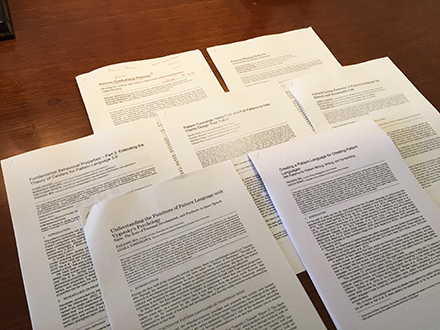
今年は、ジャーナル論文 1本、学会論文 26本、ポスター 3本の発表をし、国際学会でワークショップを5つ実施した。
発表・実施したのは、台湾、イタリア、ドイツ、アメリカで開催された5つのカンファレンス。今年も、たくさん発表したなぁ〜!一緒に論文を書いてくれた共著者たちに感謝したい。
ジャーナル論文(Journal Article)
学会論文(Conference Paper)
ポスター発表(Poster)
ワークショップ(Workshop)

井庭研だより | - | -
